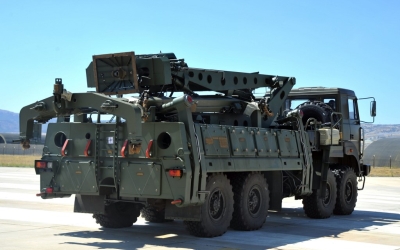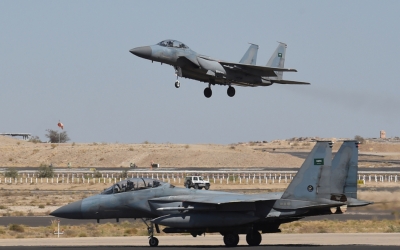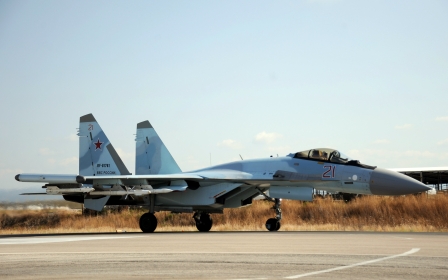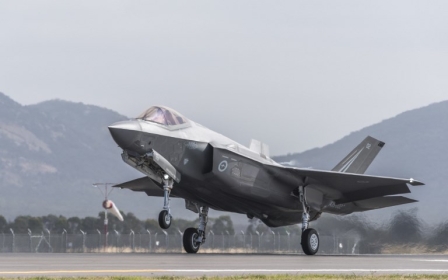Fact-check: Does Turkey's purchase of Russia S-400s really threaten NATO jets?
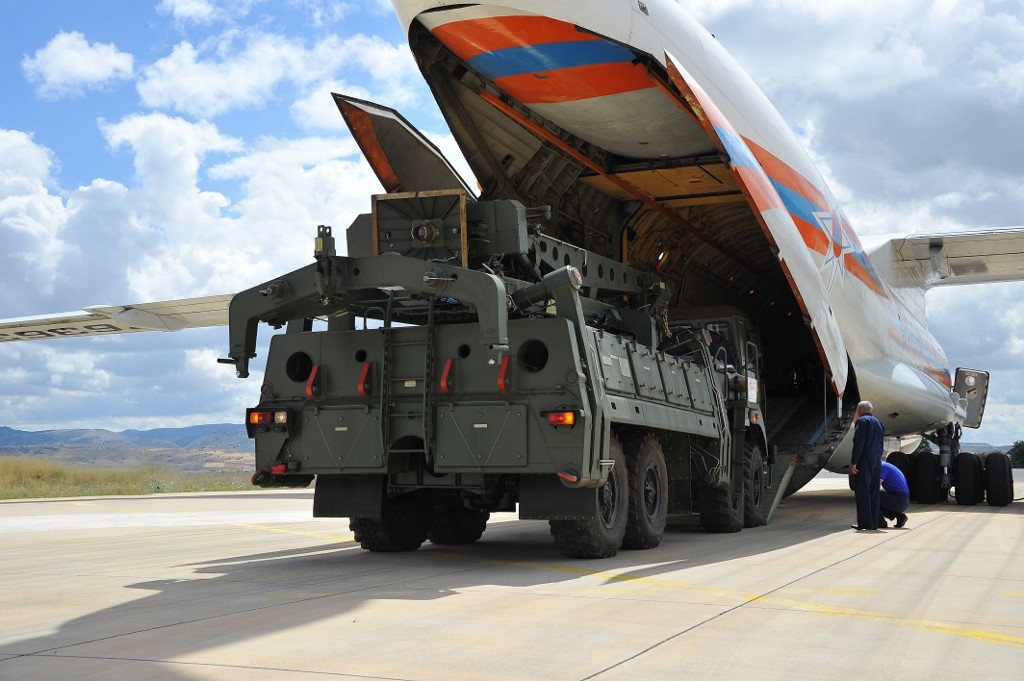
Turkey activated its Russian-made S-400 missile defence system this week, bringing the drawn-out dispute between Ankara and Washington to a head.
The United States has long argued that Turkey's purchase of Russia's S-400 missile defence system may allow Moscow to obtain intelligence on US-made F-35 jets employed by NATO, of which Turkey is a member.
While some experts say Washington's objection to the sale is a matter of political and financial self-interest, the US government says it's a security matter. So does Turkey having both S-400s and F-35s actually pose a security threat to the US and other NATO countries?
Owen LeGrone of the Forum on the Arms Trade, a Washington DC-based network of civil society experts working on the humanitarian and economic aspects of weapons sales, said Washington has a right to worry.
The two weapons systems were designed about the same time in the early 2000s and "could be seen as natural enemies", LeGrone told Middle East Eye.
New MEE newsletter: Jerusalem Dispatch
Sign up to get the latest insights and analysis on Israel-Palestine, alongside Turkey Unpacked and other MEE newsletters
"The S-400 [was] designed explicitly to be able to destroy modern American '5th generation' combat aircraft like the F-35," he said.
At the same time, the F-35 programme features a suite of advanced electronic warfare systems made to defeat Russia's air defence radars, LeGrone said.
Costing more than a trillion dollars to develop, the F-35 is considered the most expensive military weapons system in history.
Turkey was one of the first members of the F-35 jet programme, partaking and investing more than a billion dollars in its development and sending its pilots to the US for training on the warplanes.
Still, when Turkey received its first delivery of Russia's S-400s in July, Washington cancelled its fighter jet sales to Ankara and expelled the Turkish pilots from training, citing conflicts in running the two weapons systems in tandem.
Turkey has insisted it has the right to pass on the US's Patriot missile defence system for its Russian counterpart. It is betting that with work, a joint study group between Ankara and Washington will find a way it can to use both the S-400 and F-35 systems.
Earlier this month, Turkish President Recep Tayyip Erdogan said he was still open to the possibility of buying the US's Patriot system in addition to its S-400s, but stressed that Washington's attempt to pressure Turkey to opt out of its deal with Russia was "interference in [Turkey's] sovereignty rights".
"It is out of the question to completely leave Russian S-400 to buy US Patriots," Erdogan said.
Part of the S-400s' appeal is Russia's offer to include a technology transfer in the sale that may allow Turkey to build its own air defence system in the future. That's something Washington refused to include in any Patriot deal.
How does the S-400 work?
The S-400 system can use its radar to track, record and analyse the flight behaviour of planes overhead, said NR Jenzen-Jones, director of Armament Research Services, a private global arms-tracking organisation.
Jenzen said that given enough time running alongside F-35 jets, the S-400 would be able to record patterns and learn to analyse its data sets. Such data collection could allow the S-400 to identify F-35s on its radar and target the American jets with increasingly greater ease, he said.
"Generating a high volume of data by assessing as many different permutations of a scenario as possible is critical" in building air defence systems, Jenzen added.
Turkey's deal to buy the S-400s comes with a five-year contract for technical assistance from Russia, which may send experts to help train Turkish operators on the system and its upkeep.
"[This] could provide Russian intelligence operatives with easier access to data related to Turkey's air defence network, including data on aircraft," Jenzen said.
For its part, Turkey has done little to publicly allay this concern.
Implications for NATO?
The F-35s are still relatively new jets with little battlefield experience.
In May 2018, Israel became the first country to use the F-35 in combat. Israel said at the time that its F-35s had been flying "all over the Middle East" and had carried out several hits, probably in Syria.
'Regardless of all those technical considerations, the whole clash with Turkey on the S-400 is also about the US using NATO as a vehicle to sell weapons to NATO member states - and to get angry if they go after other weapons'
- Frank Slijper, Pax's Arms Trade group
In June, the UK also confirmed that it had flown its first F-35 missions over Syria and Iraq as part of ongoing operations against the Islamic State group.
Since several S-400s are believed to have been set up in Syria, concerns were raised at that time that the Russian system might already have begun collecting data on F-35 capabilities.
Still, Jenzen said that encounters of the two systems in such a scenario would only generate a fraction of the data that might come from Turkey running them side-by-side for prolonged periods of time.
"It's kind of like me taking a simple low-resolution photograph of something and asking you to build it, versus taking a 3-D scan; there's a huge difference in the amount and the quality of the data collected," Jenzen said.
He added that the S-400s may also pose a threat to other NATO systems that Turkey, as a member of the alliance, is already using.
Integrating a Russian system into Turkey's NATO network may allow the S-400 to access and pull data on a variety of defence systems, including the F-35s, from the network. "I am sure it is another threat vector Western officials would be considering," Jenzen said.
To quell those concerns, Turkey has promised not to integrate the S-400 into its NATO systems, but to operate it as a stand-alone platform.
In August, the NATO secretary general said the alliance had no intention of allowing S-400s to be integrated into any of its systems.
Political game
While US objections to Turkey's S-400 purchase have merit, politics are also at play, said Frank Slijper, project leader of Arms Trade at Pax, a Netherlands-based peace non-profit group.
"Regardless of all those technical considerations, the whole clash with Turkey on the S-400 is also about the US using NATO as a vehicle to sell weapons to NATO member states, and to get angry if they go after other weapons," Slijper said.
The US, with the world’s largest military force, is responsible for about 36 percent of the world's arms sales, according to the Stockholm International Peace Research Institute (SIPRI).
The US sells weapons to at least 98 countries, and the largest buyers are NATO members.
Last year, Russia became the world's second-biggest arms seller, with its weapons exports accounting for 9.5 percent of global sales, according to SIPRI.
Russia has made serious efforts to beef up its weapons industry, offering competitive deals on its systems, including the S-400.
China has already procured Russia's S-400 and Moscow has been courting India, Saudi Arabia, Qatar and Iran, among others, to join the list of buyers. Russia has also said it would be open to selling the defence system to the US.
But under the wide-ranging 2017 Countering America's Adversaries Through Sanctions Act (CAATSA), countries may face US sanctions for entering into arms deals with Russia.
Last year, the US slapped China with sanctions for buying Russia's S-400 system and Russian-made Su-35 fighter jets. Most recently, Egypt also purchased Su-35s from Russia, prompting the US State Department to threaten Egypt with sanctions over the $2bn deal.
US legislators have also threatened Turkey with sanctions under CAATSA.
According to Slijper: "CAATSA is not 'just' sanctions against Russia … but also a handy instrument to block Russian competition in arms procurement programmes."
Middle East Eye delivers independent and unrivalled coverage and analysis of the Middle East, North Africa and beyond. To learn more about republishing this content and the associated fees, please fill out this form. More about MEE can be found here.


